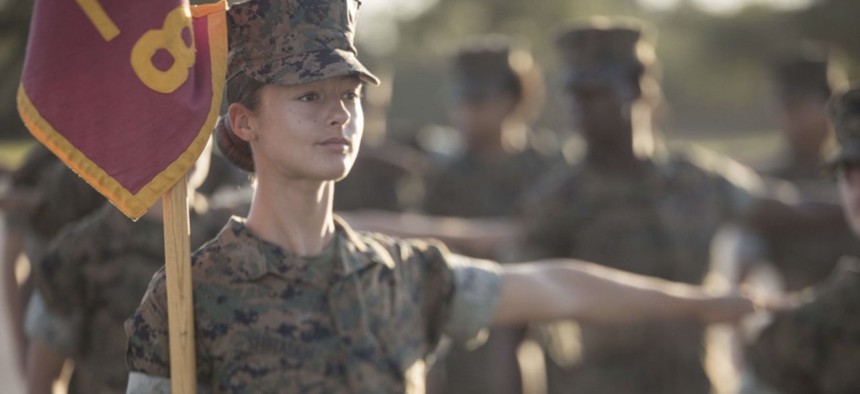
Marine Corps Rct. Rihanna N. Shihadeh, Platoon 4028, Papa Company, 4th Recruit Training Battalion, does a close-order drill movement during an evaluation Aug. 2, 2017, on Parris Island, S.C. Lance Cpl. Joseph Jacob/Marines
After the Marines United Scandal, ‘All Options’ Are on the Table
The Corps is considering integrating female recruits into West Coast training camps to help address subconscious biases, the assistant commandant said.
Less than half a year after a nude photo-sharing scandal rocked the Marine Corps, service leaders are working to hold individuals accountable and attack underlying cultural issues, according to the assistant commandant.
“I want it to get to the point where if someone participates in this kind of activity, it’s the anomaly, it happens once a year,” Gen. Glenn Walters told reporters Tuesday. “Last year we had one Marine accused of murder. That was a once-in-a-couple-year kind of event. If we can get it to that, then I’ll be happy.”
That would require addressing not just online behavior, but larger cultural issues about gender and respect as well, Walters said. Not all the victims in the Marines United scandal were women, nor were all the perpetrators men, though most were, officials said Tuesday. But the Corps was already dealing with a perception that it is unwelcoming to women. In 2015, it was the only service to request an exception to integrating women into all combat roles.
“Everybody sitting at this table has unconscious bias,” Walters said. “The trick is: how do you train us to understand it and recognize it and not let it affect our performance or our interaction with everybody else around. And that is doable.”
To get there, “all options” are on the table, he said. That could include opening up the Marines’ West Coast combat training facility to female recruits. While male recruits are split between San Diego and Parris Island for boot camp and subsequent combat training, all female recruits, a smaller group, are sent to South Carolina. That means the Marines are the only service to have half their male recruits emerge from initial training without having worked with female colleagues. And even at the Parris Island boot camp, only about 70 percent of the training is gender-integrated.
“If we’re going to change the culture of the Marine Corps, we need to change how we’re organized,” Walters said. “Our recruit training is a component of that.”
Right now, the Corps is still building out what adding female recruits to the West Coast training centers would entail, evaluating costs and benefits, and identifying metrics to determine the extent it would help address systemic biases and improve all Marines’ service, Walters said. But the AP reported that if approved, the change could happen as early as next spring.
“Talk to me in a month,” Walters said. “If we get the analysis that this is beneficial to the whole corps, then we will recommend it to the commandant and it’ll be up to him.”
The Marines have taken several other steps already. In April, they started requiring new recruits and current servicemembers to sign a contract outlining expectations for social media use. And the following month, they updated regulations to state that if a Marine posted an intimate image of someone without his or her consent, they would be processed for administrative separation.
But lawmakers have sharply criticized the Corps for not addressing what they say was a known problem sooner. In a hearing earlier this spring, Sen. Kirsten Gillibrand, D-New York, tore into Marine Corps Commandant Gen. Robert Neller, questioning whether anything would substantively change.
“I have to say when you say to us, ‘It’s got to be different,’ that rings hollow,” she said. “I don’t know what you mean when you say that. Why does it have to different? Because you, all of a sudden, feel it has to be different? Who has been held accountable?”
Thus far, one Marine has been court-martialed and two have undergone administrative separations in connection with the Marines United investigation, which got its name from a private Facebook group with more than 30,000 members. Another 30 have faced some type of non-judicial or administrative repercussion, according to Maj. Iain Pedden, the Marines’ head of military justice. In all, Pedden said, the investigation identified 100 suspects, 78 of whom were Marines.
Walters also mentioned that two Marine commanders were relieved this year, not because of any direct connection to the photo-sharing scandal, but in large part because of issues with the way their units treated women.
“A commander wasn’t behaving right or holding his people accountable, and he was relieved of command,” the assistant commandant said. “To me, that’s progress.”
Lance Cpl. Joseph Jacob/Marines
NEXT STORY: Here’s How the Military Wants to Counter ISIS Drones and Roadside Bombs







